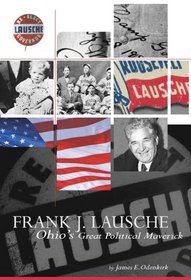Search -
Frank J. Lausche: Ohio's Great Political Maverick
Frank J Lausche Ohio's Great Political Maverick
Author:
Frank J. Lausche, first generation son of Slovenian immigrants, broke through an ethnic barrier and became Cleveland's first mayor of Eastern European ancestry with his election in 1941. He opened the door for a succession of ethnics affectionately labeled Lausche clones: Celebrezze, Locher, Perk, Kucinich and Voinovich. — Lausche began his caree... more »
Author:
Frank J. Lausche, first generation son of Slovenian immigrants, broke through an ethnic barrier and became Cleveland's first mayor of Eastern European ancestry with his election in 1941. He opened the door for a succession of ethnics affectionately labeled Lausche clones: Celebrezze, Locher, Perk, Kucinich and Voinovich. — Lausche began his caree... more »
ISBN-13: 9781882203499
ISBN-10: 1882203496
Publication Date: 8/2005
Pages: 495
Rating: ?
ISBN-10: 1882203496
Publication Date: 8/2005
Pages: 495
Rating: ?
0 stars, based on 0 rating
Publisher: Orange Frazer Press
Book Type: Hardcover
Members Wishing: 0
Reviews: Amazon | Write a Review
Book Type: Hardcover
Members Wishing: 0
Reviews: Amazon | Write a Review
Genres:
- Biographies & Memoirs >> General
- Biographies & Memoirs >> Leaders & Notable People >> Political
- History >> Europe >> Slovenia




